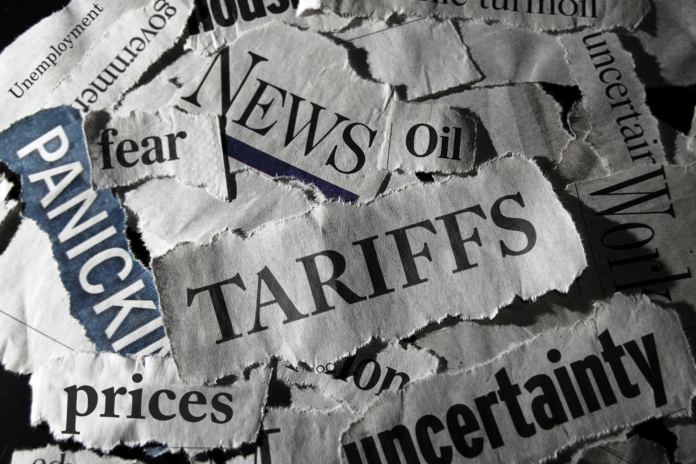The sweeping tariff policies announced by U.S. President Donald Trump on April 2, 2025, have sent shockwaves across global financial markets, triggering sharp declines in equity indices and raising concerns about long-term economic stability. With tariffs targeting imports from key trading partners like China, India, and the European Union, the move has sparked fears of a global trade war and recession, profoundly impacting investor sentiment worldwide.
Global Market Reactions
Wall Street’s Plunge
U.S. markets experienced their worst trading day since 2020, with the S&P 500 dropping 4.8%, erasing $2.4 trillion in market capitalization in a single session. The Dow Jones Industrial Average fell nearly 4%, while the Nasdaq Composite plunged by 6%. Sectors heavily reliant on global trade, such as technology and retail, bore the brunt of the selloff. Companies like Apple and Nike saw double-digit declines due to their exposure to Asian manufacturing hubs now facing steep tariffs.
Gold prices surged to record highs as investors sought safe-haven assets amid heightened uncertainty. Meanwhile, the U.S. dollar weakened against major currencies, reflecting broader concerns about inflation and economic slowdown.
Asian Markets
Stock exchanges in Beijing and Tokyo recorded their lowest levels in months following the announcement. China’s Shanghai Composite fell sharply as the country faced a staggering 54% tariff on its exports to the U.S., prompting fears of supply chain disruptions and retaliatory measures. Similarly, Japan’s Nikkei 225 dropped significantly due to its reliance on U.S.-bound exports.
European Markets
European indices also suffered steep losses, particularly in export-driven economies like Germany. The FTSE 100 fell by 1.5%, while shares of luxury brands and automobile manufacturers declined due to higher tariffs on EU goods.
Impact on Indian Markets
India’s benchmark indices, the BSE Sensex and Nifty 50, opened lower on April 4 but showed resilience compared to other Asian markets. The Sensex fell over 800 points during intraday trading before recovering slightly to close down by 721 points. Similarly, the Nifty slipped below the critical support level of 23,000 but ended marginally lower after a volatile session.
Sectoral Performance
- IT Sector: Indian IT stocks faced heavy selling pressure due to concerns over reduced U.S. business demand amid rising tariffs. Major companies like Infosys and TCS saw declines of up to 4%.
- Pharmaceutical Sector: Pharma stocks bucked the trend with gains as they were exempted from U.S. tariffs, benefiting from continued export opportunities to America’s healthcare market.
- Auto Sector: Automobile stocks faced losses due to supply chain disruptions and higher input costs resulting from tariffs on components imported from other Asian countries.
Foreign Portfolio Investments (FPIs)
FPIs pulled out ₹2,806 crore from Indian equities on Thursday, reflecting heightened risk aversion among global investors.
Long-Term Implications for Global Trade
Economic Growth Slowdown
The tariffs are expected to dampen global economic growth by increasing costs for businesses and consumers alike. The IMF has hinted at revising its global growth forecast downward for 2025 due to these developments.
Supply Chain Realignments
Countries like India may benefit from lower tariff rates compared to China and Vietnam, potentially attracting investments as companies look to diversify their manufacturing bases away from heavily taxed regions.
Inflationary Pressures
Higher import costs could stoke inflation globally, complicating monetary policy decisions for central banks like the Federal Reserve and Reserve Bank of India.
Geopolitical Risks
Retaliatory measures by affected nations could escalate tensions further, undermining decades of progress in liberalized trade frameworks.
Conclusion
The U.S.’s tariff announcements have introduced significant volatility into global financial markets while raising critical questions about long-term economic stability and trade relations. For India, while certain sectors like pharmaceuticals may benefit from exemptions, export-driven industries such as IT and automobiles face immediate challenges.
As markets adjust to this new reality, governments and corporations worldwide must navigate an increasingly protectionist environment that threatens to reshape global trade dynamics for years to come.


